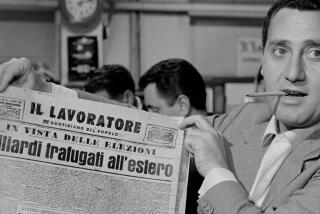Review: Jaunty 1963 Vittorio De Sica comedy âIl Boomâ is full of delightful suprises
Imagine Buster Keaton crossed with David Lynch, with a bit of Billy Wilder satire tossed into the mix, and youâll have a rough idea of the wild and crazy tightrope 1963âs absurdist âIl Boomâ manages to walk.
A comic yet corrosive dissection of how soulless a consumption-obsessed society can become, âIl Boomâ never received a U.S. release until now despite having, in director Vittorio De Sica, writer Cesare Zavattini and star Alberto Sordi, a crack Italian creative team.
But what this crisp new restoration reveals is that âIl Boomâ is a film out of time, more suited to today, where acid views of human nature and surreal plots are thick on the land, though not usually combined with the panache theyâre joined with here.
For American audiences who know both De Sica and Zavattini through their collaborations on spare, neo-realist classics like âBicycle Thievesâ and âShoeshine,â it is intriguing to see them in a different guise, making a socially concerned film but one that is very much in the satiric mode.
âIl Boomâ is also a fine opportunity to spend more time with Sordi, one of the greatest and most domestically popular of Italian actors, as brilliant as he is little known outside his core fan base.
With his beautifully expressive face, Sordi is, among other things, a master of comic desperation, able to be simultaneously funny and serious. In âIl Boom,â he has a lot to be desperate about.
As its title indicates, âIl Boomâ takes place in the heart of Italyâs postwar economic boom, the days of la dolce vita, the sweet life, when everyone was making money. Giovanni Alberti (Sordi) is making money as well, just not as much as he needs.
Introduced in the credits spending money hand over fist, Alberti is living over his head because Silvia (Gianna Maria Canale), the wife he desperately loves, is a lover of luxury, and he canât bear to tell her that the lifestyle she enjoys is beyond their means.
âIl Boomâ begins in the middle of a crisis for Alberti. In the habit of spending twice as much as he makes and borrowing money and writing bad checks to make up the difference, he is terribly in debt, with payments coming due.
Alberti has friends who could easily help him, but he is conflicted about asking for assistance, uncertain about how vulnerable he can afford to be, and situations where he goes back and forth with these folks show Sordi at his best.
Frantic about money though he is, Alberti never thinks of cutting back on partying and expenditures, and scenes of him and his friends going to steeplechase races and dancing to that new American craze the Twist enable Sordi to play the ever-hopeful striver, a jaunty smile on his face even in his darkest moments.
It is at one of these social events that Alberti meets the enormously wealthy Commendatore Bausetti (Ettore Geri) and his dowdy wife, la Signora Bausetti (Elena Nicolai, a La Scala mezzo-soprano before she turned to acting.)
When la Signora takes an unmistakable shine to Alberti and invites him to a secret afternoon rendezvous, he takes a deep breath and hopes it is all for the best.
But what la Signora suggests (not to be revealed here) is a complete shock to Alberti and catapults âIl Boomâ into a completely different gear, unapologetically out-there and outrageous.
Providing a counterpoint to the plotâs bittersweet and energetic comedy of despair is âIl Boomâsâ jaunty Piero Piccioni score, which makes excellent use of a jukebox hit of the period called âWheels.â Those familiar with the song will be surprised to find it here, but being unexpected is what âIl Boomâ is all about.
-------------
âIl Boomâ
In Italian with English subtitles
No rating
Running time: 1 hour, 25 minutes
Playing: Laemmleâs Ahryna Fine Arts, Beverly Hills
See the most-read stories in Entertainment this hour Âť
Movie Trailers
More to Read
Only good movies
Get the Indie Focus newsletter, Mark Olsen's weekly guide to the world of cinema.
You may occasionally receive promotional content from the Los Angeles Times.










